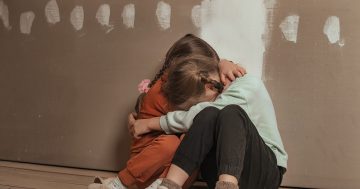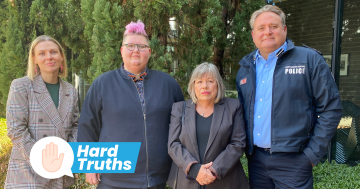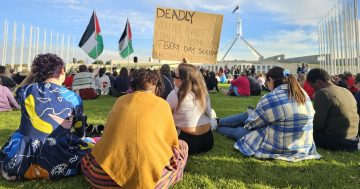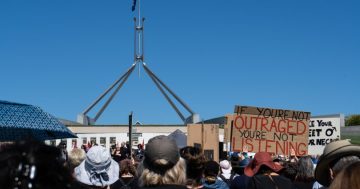
With four new members, the DVCS board (left to right) Sue Webeck, Kate Glynn, Amanda Benn, Kylie Burnett, Manasi Ahuja, Karen Moore, Stephanie Serhan, Julie Vey and Adam Gill bring together a combination of corporate and professional expertise and lived experience. Photo: Thomas Lucraft.
Sustainability is the magic word for the Domestic Violence Crisis Service (DVCS) in Canberra following its recent AGM where five new board members were appointed.
Joining the board are Maisi Ahuja, Julie Vey, Karen Moore and Adam Gill.
DVCS CEO Sue Webeck said the board’s composition positioned it well to understand the evolving corporate environment that even not-for-profits must operate in and how to achieve sustainability as an organisation, particularly in corporate undertakings.
“Over the last couple of years, the organisation has prioritised funding and community partnerships with other agencies operating in the ACT,” she said.
“This coming year is a time to solidify our sustainability as an organisation in the way we function and deliver programs and services but also in the way we engage with government in the procurement of those services.
“The AGM saw a number of outgoing members who had significant corporate knowledge and guided the organisation in the transformational process of the past few years. What we see in the new members coming in is a wide range of lived experience as well as professional experience, which can only support the representation of the people we exist to serve in the way we govern this organisation.”
This will be critical in the coming years, as demand for DVCS continues to rise.
When Ms Webeck started with DVCS in 2021, about 850 clients per month were engaging across its services. In 2023, month on month, the organisation has been seeing 1050 to 1100.
She said this trend, along with the recent spotlight and focus on domestic and family violence in recent times, hopefully set the stage for much-needed change.
“We are at the precipice of opportunity in regards to the national plan to end violence against women and children, noting that the ACT will have an action plan under the national action plan,” she said.
Ms Webeck said on the other hand, this visibility of the issues was sometimes a double-edged sword.
“Violence in the community has been at the fore of lots of discussion in the media over the last few years, yet what most people are unaware of is discussions in public forums haven’t necessarily resulted in funding sustainability and service delivery at the front lines,” she said.
“There are real challenges when it comes to people’s perceptions of the way services are operating versus the funding environment we’re operating in.
“This can have a potential impact on decisions of commonwealth and territory government as to how to disperse funding, but it also strains the good will of the community, which may dissipate if there’s a perception that front-line services are getting more funding than they are … They may feel worn down by conversation and disheartened by lack of progress. It puts us at risk of complacency and that’s quite dangerous.”
The DVCS board this year will continue to focus efforts on reaching more people and ensuring as many as possible get the support they need.
In particular, they will look at mapping clients’ needs and addressing gaps in the funding model, such as the significant need for more case management.
However, it won’t focus entirely on further funding for its own operations and services, but also advocacy to increase the funding pool overall.
“We want to support community partners as well, ones that may be more suited to delivering certain critical types of service, or to collaborate with them where appropriate,” Ms Webeck said.
“We recognise that we are just one part of a bigger picture, among many organisations working towards a better future for women and children in this country.”



















